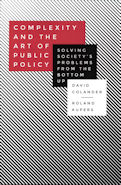Complexity science—made possible by modern analytical and computational
advances—is changing the way we think about social systems and social theory.
Unfortunately, economists’ policy models have not kept up
and are stuck in either a market fundamentalist or government control narrative.
While these standard narratives are useful in some cases, they are damaging in others,
directing thinking away from creative, innovative policy solutions.
Complexity and the Art of Public Policy outlines a fresh,
more flexible policy approach, one which envisions society as a complex evolving system
that is uncontrollable but can be influenced.
David Colander and Roland Kupers describe how economists and society
became locked into the current policy framework,
and lay out original and innovative alternatives for framing policy questions,
in order to foster a structure in which diverse forms of social entrepreneurship
can emerge and blossom.
